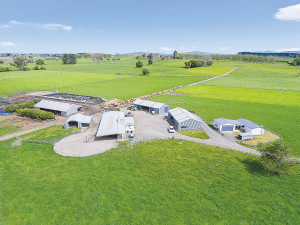An $8/kgMS milk price will 'bring no joy to farmers'
A Waikato accountant says dairy farmers putting together their budget for 2025 won’t have much to cheer for even with an $8/kgMS forecast milk price.
 Farmers are being urged to be proactive and budget for compliance with the new greenhouse gas (GHG) emission regulations.
Farmers are being urged to be proactive and budget for compliance with the new greenhouse gas (GHG) emission regulations.
A Waipa-based chartered accountant says the average Waikato dairy farm could incur a $5,200/ year cost when the Zero Carbon Act comes into force in 2025.
Jarrod Godfrey, associate partner at Findex Waikato, is encouraging farmers to be proactive and budget for compliance with the new greenhouse gas (GHG) emission regulations.
He says the Government’s target of a 10% reduction in agricultural GHG emissions by 2030 means the sector needs to have a form of pricing system for agricultural GHG emissions by 2025.
“We don’t know what that pricing system looks like just yet, but we do know what the current version of the Emissions Trading Scheme (ETS) looks like. If you use the ETS as a guide for what the agricultural system might look like, then you can take steps now to quantify that potential cost to your farming business,” Godfrey says.
Under an ETS-type system, farmers might have the option to physically reduce GHG emissions by 10%, purchase carbon credits from a market to achieve a similar result, or a mixture of both.
All three options have costs associated to them.
Godfrey says that a reduction in GHG emissions could be achieved by reducing stock numbers, planting trees on farm, or a farm system change, among other options. However, he says, the financial impact of these options varies significantly.
“Purchasing carbon credits to achieve that 10% reduction might be the other option, something which can be quantified more easily using the current price of carbon credits as a guide.”
He says that for an average 130ha Waikato dairy farm, peak milking 365 cows under a Dairy NZ System 3, GHG emissions could be close to eight tonnes per ha. Multiplied by an average effective area of 130ha, this means estimated GHG emissions of 1,040 tonnes.
“Farmers are generally more conservative in nature, but also very proactive in managing risk in their farming business. We’re starting to see some take steps now to budget for the medium-term cash impact of that 10% reduction. At $50 per tonne, that would be $5,200 per year for a standard 130ha Waikato dairy farm,” says Godfrey.
He adds that having knowledge of that number now is helping farmers prepare for the future, getting them prepared now for when the pricing system for agricultural GHG emissions is announced in 2025.
He recommends using the tools already available through Dairy NZ and He Waka Eke Noa, including GHG emissions calculators. “Taking steps now to estimate that number will help farmers understand the potential impact on their business – and ultimately rest a little easier.”
Keratin biomaterials company Keraplast and Wools of New Zealand have signed a new superpremium wool contract which is said to deliver a boost to wool growers.
While things are looking positive for the red meat sector in 2026, volatility in global trade remains a concern, says the Meat Industry Association (MIA).
The quest to find innovative practical, scientific solutions to deal with water-related issues at a catchment level has been the theme of an important conference at Massey University last week.
One of the country's top Māori farms faces a long and costly rebuild to get the property back to where it was before recent storms ripped through it.
The latest Global Dairy Trade auction results have delivered a boost to dairy farmers.
New Zealand potato growers are prioritising value creation from high yields to meet a complex mix of challenges and opportunities, says Potatoes NZ chief executive Kate Trufitt.
OPINION: Fonterra may be on the verge of selling its consumer business in New Zealand, but the co-operative is not…
OPINION: What does the birth rate in China have to do with stock trading? Just ask a2 Milk Company.